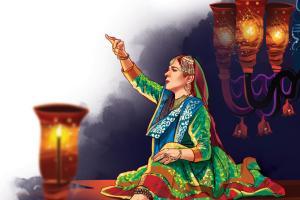Writer-filmmaker Saba Dewan's new book, a culmination of 20 years of research on tawaifs, explains how this community of culture practitioners was systematically de-legitimatised

Illustration/Uday Mohite
Nineteen years is a long time in an individual's life. It's the time one takes to grow out of infancy and reach adulthood, or switch from the pinnacle of their career to retirement. For Delhi-based filmmaker-writer Saba Dewan, it marked the years she spent engaging with the community of tawaifs, "the courtesans and entertainers who had, until almost the mid-20th century, played a significant role in the cultural and social life of northern India". Starting with 2001, when Dewan began work on her documentary, The Other Song (2009), which dealt with the art and lifestyle of the tawaifs, to her new non-fiction, Tawaifnama (Context, Westland), the journey, says Dewan, has been enlightening.
"There is this tendency to label tawaifs either as victims or simply as survivors, but these are easy categorisations. Because as far as human life is concerned, you cannot see things as black and white," she says, over a telephonic interview. "That is one of the biggest things I learnt [while researching the tawaifs] over the years. I had gone with certain feminist notions, in which you looked at certain things in a certain way, but the fact is that real lived life doesn't quite conform to what one would like it to be. Today, I feel very uncomfortable about such labels."
ADVERTISEMENT
While reams of literature and films have been dedicated to the enquiry of this community of performers— patronised only by the rich and royal —Dewan's book is unlike any other, because it weaves a tale around their glorious years and fall from grace, but through the multi-generational chronicle of a family of tawaifs. "The film laid the foundation for the book. It took me a long time to convince women from tawaif families to even allow me to enter their households. It was over a period of time, while simultaneously shooting with them that I forged a close relationship with a woman and her family," says Dewan, who started writing this book in 2010.

Saba Dewan
The book, which is cinematic in style and flow, opens in Benares, the land where tawaifs once "congregated in large numbers, making the city a premier centre of the arts associated with them... the bol-banao thumri and its associative genres such as hori, chaiti, kajari and dadra", and Kathak. Here, she introduces us to the woman she befriended, who after much persuasion agrees to talk about her family's rich legacy. She takes us back to Dharmman Bibi, the early 19th-century tawaif-turned-warrior, who fought the Rebellion of 1857. Her story is pertinent because while the British typecast all tawaifs as "prostitutes", as a loyal lover and mistress of Babu Kunwar Singh of Jagdishpur, a zamindar of the district, Dharmman represents everything that was in contrast with the popular representation of this community.
"Colonial writings of that time harped about dancing girls being steeped in decadent pleasures. Even some of the archival material I referenced for the book, provided an insight into the way colonial law constructed female sexualities that were non-marital. So anyone who was not married, but sexually active, had to be a prostitute. The labels were simple and crude," says Dewan. "Unfortunately, it had negative consequences for the tawaifs, who did not fare any better with the rise of nationalism. What the nationalists did was to internalise much of the morality and many of the prejudices of colonial rulers. It was reflected in law-making and the arts that they patronised— some culture practitioners became acceptable, others didn't. The tawaifs got the wrong end of the stick from everyone."
Today, she says, there are no practising tawaifs. "Even in places like Mumbai, kothas are sustained only for tourist interest," she adds.She hopes that a book like hers opens up a conversation around the injustice meted out to tawaifs. "There is a need to make people aware about the huge contribution these women made to the arts, and the debt we owe them. This was a group of women, who had a very unique, autonomous lifestyle. We need to engage with it, without the mythology associated with it, in order to understand the processes by which they were de-legitimatised and dis-empowered."
What: Tawaifnama by Saba Dewan
Price: Rs 899
To buy: amazon.in
Catch up on all the latest Mumbai news, crime news, current affairs, and also a complete guide on Mumbai from food to things to do and events across the city here. Also download the new mid-day Android and iOS apps to get latest updates
 Subscribe today by clicking the link and stay updated with the latest news!" Click here!
Subscribe today by clicking the link and stay updated with the latest news!" Click here!







